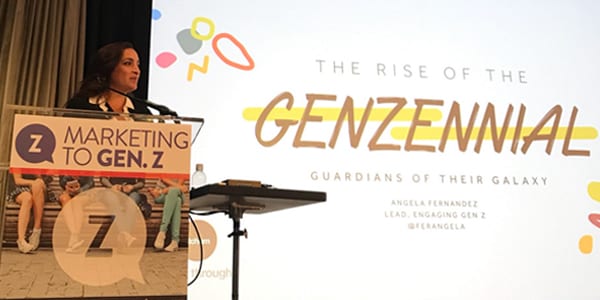 You’ve probably read some headlines recently like, “Move Over Millennials, Gen Z is Here” or “Gen Z May be Marketers’ New Golden Child.” So, now that this post-Millennial generation is finally capturing the attention of media and marketers, I was eager to attend and speak at the second annual “Marketing to Gen Z Conference” in New York in mid-July. I felt right at home geeking out with fellow speakers and experts who are just as fascinated about this emerging powerhouse generation as I am.
You’ve probably read some headlines recently like, “Move Over Millennials, Gen Z is Here” or “Gen Z May be Marketers’ New Golden Child.” So, now that this post-Millennial generation is finally capturing the attention of media and marketers, I was eager to attend and speak at the second annual “Marketing to Gen Z Conference” in New York in mid-July. I felt right at home geeking out with fellow speakers and experts who are just as fascinated about this emerging powerhouse generation as I am.
From food to fun to phones, the conference presented several targeted insights about how Gen Z is re-shaping marketing and forcing us to re-think ways to engage this elusive and savvy next-gen consumer.
Here are four of my favorite takeaways:
1. Angie Read, Vice President of Barkley Research, eloquently and simply described this generation as “old souls in little bodies.” While most are not even of legal voting age, this generation is known to be pragmatic and conservative about their approach to life.
2. Manager of Insights Marketing at Google, David Kagan, reminded us that while this is a mobile-first generation, they are not superficially obsessed with their phones, but use their phones as the ultimate tool. We know that they innate fact checkers. Why not? They have always had the answer to every question in the palm of their hands, which means they are not just digital natives, they are data natives. Understanding the power of data, Gen Z is cautious and strategic about the social media footprint they leave behind. 75 percent of Gen Z’rs surveyed by Google said they carefully consider what they publish on their social channels.
3. Jose Villa of Sensis and Mario Xavier Carrasco of ThinkNow Research emphasized the importance of diversity and multi-culturalism among this young cohort. While one of the most ethnically diverse generations in history, this audience also cares about diversity of thought and culture. Therefore, language and borders are less relevant. Instead, we have to adopt a cross-cultural strategy – allowing your audience to be exposed to, and immersed in, other cultures – in order for Gen Z to identify with you.
4. From rainbow cake to quinoa bowls, Amy Henry at Strottman International underscored that food innovation matters to this generation. However, while kids have high expectations of their schools and universities to offer them choice and transparency, they also demand convenience and value.
Finally, during my panel, my underlining message to those in attendance was to consider the triple threat of audience insights: cohort + life-stage + mindset. And when we look at how savvy and sophisticated this young consumer is across categories and industries – we can no longer MARKET TO this audience, we need to ENGAGE and INVOLVE them. That real engagement has to start with this question: Beyond the product or service you offer, what are you doing FOR your young consumer?
Here are four ways you can show them you understand their world:
1. Reward with experiences.
For today’s youth, we know that experiences matter more than possessions. These experiences contribute to their influence, the centerpiece of their personal brand. Brands have a tremendous opportunity to help their voices get heard, to instigate change, to rally movements, and to offer these experiences.
2. Leave the finger-wagging to their parents.
Brands are uniquely positioned to educate and empower kids and teenagers without nagging. With an overwhelming distrust and distaste for traditional institutions – youth today have more faith that the brands they love have the power to be nimble and innovative – and can influence real change.
3. Invite them to co-create with you.
Invite your young consumers in. Let them be part of the process. They want to be part of your brand’s triumphs as well as the honest yet brave failures. While they expect innovation, they don’t expect perfection.
4. Use your power for good.
This doesn’t necessarily mean saving the planet. But it can mean not taking yourself or your brand so seriously and allowing your fans to have some fun with you.
To engage Generation Z is to live in their world. That means understanding their passions, their fears, their aspirations and their humor. In the immortal words of Ginny Weasley (of Harry Potter fame), “The thing about growing up… is that you sort of start thinking anything’s possible if you’ve got enough nerve.”



